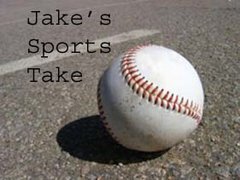"Size is overrated"
(Note: This is probably the last time all season I'll say a good thing about the New York Knicks).
You know what my favorite moment of the still young NBA season has been? When little Nate Robinson (listed as 5-foot-9, but he looks about 5-foot-7) got up in the grill of Yao Ming and stuffed the 7-foot-5 center (who actually looks 7-5). It was the most legitimate block I've seen all season.
And by a 5-foot-7 guy.
Robinson didn't just stuff Yao, he tossed aside the perception that you have to be "tall" or "big" to be successful in the pros.
Size is one of the most overrated things in American society. It goes all the way back to the 1990s (I know, seems so long ago) and the "Super Size" phenomenon. Whenever I went to McDonalds with my friends, I wasn't manning up unless I "Super Sized" that Big Mac meal.
Hey, if you're gonna eat the junk, might as well go all out, right?
But this "bigger is better" fetish isn't just related to food and Texas culture.
It's evident in sports as well. Especially in football and basketball. Every spring before the NFL draft scouts drool over "tall quarterbacks." Every summer prior to the NBA draft, scouts question whether smaller players will be able to compete in the league. They question whether they'll be able to guard "bigger guards."
And yet, despite all the doubters, despite the lack of respect, "little guys" continue to get it done in the NFL and NBA.
Allen Iverson (ever heard of him?) is just 6-foot. Still, he's been a force in the league now for 10 seasons. He's led the league in scoring four times, won an MVP and taken an overachieving team to the NBA Finals. Despite this, people continue to question him (especially now that he's finally asked out of Philadelphia).
For five years people have said that Iverson, 31, will wear down, that his body will not be able to handle the beating he takes any longer. Uh, yeah, I'd still take a guy averaging 31 points and seven assists. Even if he was 4 feet.
I can't believe teams aren't rushing to put together packages for Iverson. Here's a team willing to ship one of the top 10 players in the league, and people aren't going crazy over him?
Ludicrous.
Troy Smith still has one very important college football game to play, but after that he'll start preparing for April's NFL draft. Only recently have people started considering him even a top 15 pick. Here we have the nation's most successful quarterback, the only OSU QB ever to take down Michigan three times. And he's not even considered a top 10 pick.
It all comes down to size. Scouts don't think the 6-foot-1 Smith will have the vision he needs to make accurate throws. They prefer Notre Dame’s Brady Quinn, who's 6-foot-4 and a possible No. 1 pick. It doesn't matter that Quinn has never won a bowl game or beaten USC, Notre Dame's prime rival. He's got the size and arm, so he'll be fine.
While size is overrated, winning, it appears, is underrated. Last season Vince Young, who quarterbacked Texas to the national title, was questioned over and over again because he scored poorly on the Wonderlic IQ test.
Who cares? He's a winner, he’s athletic and he’s a good passer - that's all that should have mattered. Right now Young is making teams that passed over him look silly, including the Texans, who he beat in overtime on Sunday.
The NFL's hottest quarterback, Drew Brees, is barely six feet - shorter than Smith. He, of course, was not considered a high draft pick coming out of Purdue, despite leading the Boilermakers to their first Rose Bowl in 34 years in 2001. He was taken in the second round by the San Diego Chargers, who got a certain L.T. in the first round.
Not a bad draft, I'd say.
You want more? How about less (size)?
Two of the NFL's best wide receivers are hard to spot - they're simply too small. Carolina's Steve Smith (who, I'm sure, the Bears are hoping doesn't make an appearance in the playoffs) is a nice 5-foot-9. Marvin Harrison, Peyton Manning's favorite target, is a short 6 feet. Both players are 185 pounds, yet they continue to lead their team in the receiving department year after year. Harrison, in his 11th season, has missed just five games in his career. While Smith missed most of the 2004 season because of an injury, in every other season he's played nearly every game.
Remember the NBA Finals last June? Remember that guy who willed Miami to victory? Yeah, that was Dwyane Wade, all 6 feet, 4 inches of him. For a shooting guard in the NBA, he's undersized. But that hasn't stopped him from becoming one of league's top five players.
Let's minimize this. Earl Boykins is 5-foot-5. Since he graduated from Eastern Michigan he's been doubted. No one thought he could possibly be successful at the professional level. Now, for four straight years, he's scored in double figures as Denver's backup point guard.
Don't get me wrong. Size is important. There are no 6-5 centers in the NBA, no 200-pound defensive linemen in the NFL. But don't underestimate the heart of the little guy. These guys play as if they have something to prove, and often they do prove something: that they belong just as much, if not more, than the taller guys on either side of them.
And yet they still don’t receive the respect they deserve.


No comments:
Post a Comment